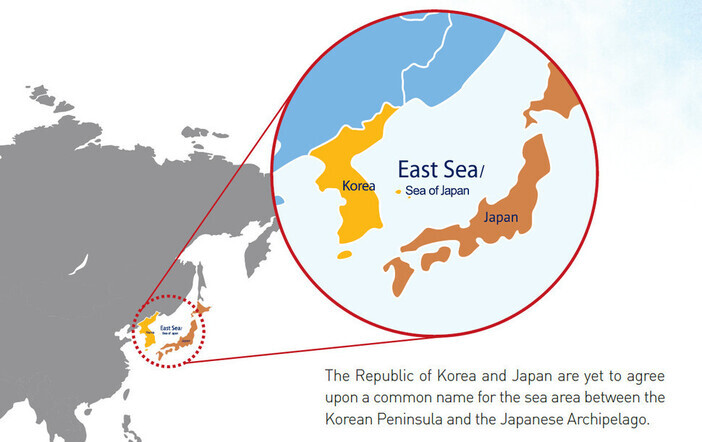hankyoreh
Links to other country sites 다른 나라 사이트 링크
East Sea to be labeled in numbers as result of IHQ debate with Japan

Who won?
South Korea and Japan have been battling it out within the International Hydrographic Organization (IHO) over the labeling of the East Sea, each of them interpreting its “final conclusion” on the more than 20-year debate in a way that favors their own claims.
According to accounts on Nov. 17 from the South Korean and Japanese governments, the IHO held a teleconference on the evening of Nov. 16 where a report produced after closed-door discussions over the labeling of the East Sea among the US, the UK, and the three parties involved in the dispute — South and North Korea and Japan — was provisionally approved by unanimous vote. The report centered on the introduction of a new digitally based “S-130” standard without amending the “Limits of Oceans and Seas” (S-23) publication that the IHO has used in the past for guidelines on the production of nautical maps.
So far, the key aim of the East Sea “co-listing” campaign has been to amend the exclusive use of the name “Sea of Japan” in the S-23 publication issued by the IHO in 1929 and have the name “East Sea” listed as well. After confirming that the exclusive use of the “Sea of Japan” label — which was decided on during the Japanese occupation of Korea — was retained in the second and third editions in 1937 and 1953, respectively, the South Korean government has been involved in a diplomatic campaign to amend it since the beginning of amendments for the fourth edition in 1997.
With the debate between South Korea and Japan dragging on for over 20 years, the IHO used a clever tactic to conclude things with a “tie.” Its plan is to abandon amending the S-23 altogether in favor of introducing a new “S-130” standard for the digital era. This is to involve the adoption of distinguishing numbers rather than place names such as “Mediterranean Sea.” The plan received unanimous support from member countries in a Nov. 16 general meeting. For South Korea, it means that while the exclusive use of the “Sea of Japan” name was not replaced with a co-listing with “East Sea,” an achievement has been realized in having all names of seas —including “Sea of Japan” — removed from the digital standard to be adopted in the future.
Speaking in a regular press conference on Nov. 17, Ministry of Foreign Affairs Deputy Spokesperson Lee Jae-woong said, “While this decision is not in complete accordance with the government’s position in its attempts to have the ‘East Sea’ label co-listed, we see the plan as reflecting both sides’ positions in a balanced fashion.”
“With the replacement of S-23 with a new standard, the standardized status of the ‘Sea of Japan’ name has been downgraded,” Lee concluded.
Meanwhile, Japan offered a different take. Chief Cabinet Secretary Katsunobu Kato said, “The S-23, which has accepted ‘Sea of Japan’ as the only international established name, will be able to remain in use for IHO publications as it is now.”
Japanese Minister of Foreign Affairs Toshimitsu Motegi said, “On paper, ‘Sea of Japan’ remains. We see the Japanese position as having carried the day.” Based on a self-serving interpretation of the IHO’s explanation that the S-23 publication will remain in analog format during the new standard’s development in order to show the historical shift toward the digital era, this position maintains that the document’s survival means that Japan has “won.” Yoo Euy-sang, a former international ambassador for geographic naming with the South Korean Ministry of Foreign Affairs, said, “There is no need to respond point to point to this sort of interpretation, which disparages the efforts made by the IHO.”
By Gil Yun-hyung, staff reporter
Please direct comments or questions to [english@hani.co.kr]

Editorial・opinion
![[Editorial] Penalties for airing allegations against Korea’s first lady endanger free press [Editorial] Penalties for airing allegations against Korea’s first lady endanger free press](https://flexible.img.hani.co.kr/flexible/normal/500/300/imgdb/original/2024/0502/1817146398095106.jpg) [Editorial] Penalties for airing allegations against Korea’s first lady endanger free press
[Editorial] Penalties for airing allegations against Korea’s first lady endanger free press![[Editorial] Yoon must halt procurement of SM-3 interceptor missiles [Editorial] Yoon must halt procurement of SM-3 interceptor missiles](https://flexible.img.hani.co.kr/flexible/normal/500/300/imgdb/child/2024/0501/17145495551605_1717145495195344.jpg) [Editorial] Yoon must halt procurement of SM-3 interceptor missiles
[Editorial] Yoon must halt procurement of SM-3 interceptor missiles- [Guest essay] Maybe Korea’s rapid population decline is an opportunity, not a crisis
- [Column] Can Yoon steer diplomacy with Russia, China back on track?
- [Column] Season 2 of special prosecutor probe may be coming to Korea soon
- [Column] Park Geun-hye déjà vu in Yoon Suk-yeol
- [Editorial] New weight of N. Korea’s nuclear threats makes dialogue all the more urgent
- [Guest essay] The real reason Korea’s new right wants to dub Rhee a founding father
- [Column] ‘Choson’: Is it time we start referring to N. Korea in its own terms?
- [Editorial] Japan’s rewriting of history with Korea has gone too far
Most viewed articles
- 160% of young Koreans see no need to have kids after marriage
- 2Presidential office warns of veto in response to opposition passing special counsel probe act
- 3[Editorial] Penalties for airing allegations against Korea’s first lady endanger free press
- 4Hybe-Ador dispute shines light on pervasive issues behind K-pop’s tidy facade
- 5S. Korea “monitoring developments” after report of secret Chinese police station in Seoul
- 6Months and months of overdue wages are pushing migrant workers in Korea into debt
- 7OECD upgrades Korea’s growth forecast from 2.2% to 2.6%
- 8Inside the law for a special counsel probe over a Korean Marine’s death
- 9Japan says it’s not pressuring Naver to sell Line, but Korean insiders say otherwise
- 10[Exclusive] Hanshin University deported 22 Uzbeks in manner that felt like abduction, students say